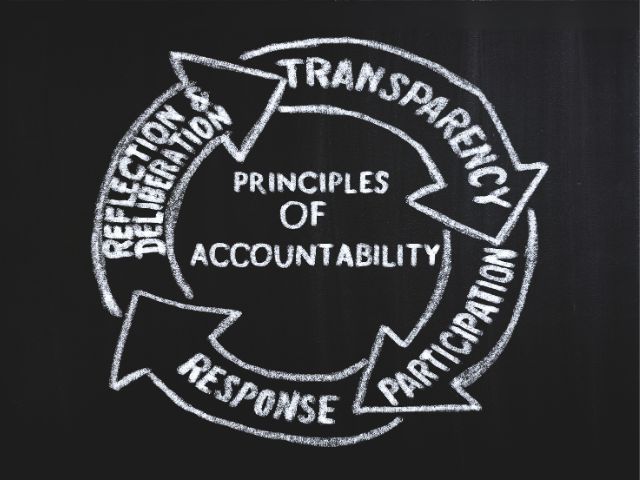We use cookies to enhance our website for you. Proceed if you agree to this policy or learn more about it.
- Essay Database >
- Essay Examples >
- Essays Topics >
- Essay on Family

Accountability In Nursing Essay Examples
Type of paper: Essay
Topic: Family , Training , Parents , Patient , Exercise , Actions , Nursing , Medicine
Words: 1250
Published: 03/14/2020
ORDER PAPER LIKE THIS
Introduction
Accountability is one of the key concepts that fortifies the professional practice nursing. Accountability is said to be at the heart of nursing and on an overall scale, it helps in the improvement of nursing practice. The term has often been defined differently in different medical circles but in its most basic definition, accountability is simply a special phenomenon in nursing practice whereby nurses working in any caregiving setting take the credit for, are entrusted with, are blamed for and are also be judged within moral and ethical boundaries (Rowe, 2000 p. 550). This means that the nurse is answerable for any actions taken in any particular nursing situation. The nurse holds some liability in responding to various issues experienced in the course of nursing practice and understands that he or she will be held liable for these actions Therefore, accountability should hold the basis of all the actions in every clinical setting. A nurse should not respond in a particular way or take actions that she knows she might not be accounted for favorably (Rowe, 2000 p. 551). Accountability leads to enhanced quality of care and improves overall health outcomes as it entails taking actions that are in the best interests of both the patient and the nurse. To explore more on this issue, this essay will Shalof T’s book “A nurse’s story: Life, death, and in-between in an intensive care unit” to identify examples where the concept of accountability has been exhibited. Using the identified examples, the aim of the essay will be to show that when accountability is applied as part of professional nursing practice, it leads to improved health outcomes and also enhances the process of delivering care. In the book, “A nurse’s story: Life, death, and in-between in an intensive care unit, Shalof provides the reader with a vivid description of the everyday life of ICU nurses. Shalof, who is an experienced Canadian writer and a nurse describes vividly some of the issues and situations that nurses at the ICU go through and gives the reader an inside look at some of these situations. It is in some of these situations that the concept of accountability can be identified. One of the examples where the concept of accountability is exhibited is where she is talking about a son who is unwilling to let his mother go even if the father is very aged and is experiencing multiple organ failure. The son is insistent that if need be, heroic measures be taken by the medical providers to cater for this mother (Shalof, 2004, chapter 3). This is in spite of the fact that these measures might just bring more suffering to the mother. Shalof exhibits great accountability on her part as she tries to explain to the son that at this point, medical interventions on his father would just bring him more suffering and it would be more advisable to let him go. Shalof is accountable because she knows that she will be judged on the actions she takes to ensure the well-being of the patient. In this case, ensuring the well-being of the patient means not allowing him to suffer anymore by stopping all medical interventions and letting him die peacefully. Therefore, this is one of the examples in Shalof’s book where the concept of accountability is vividly exhibited and described by Shalof herself in the course of her professional practice. The other example where the aspect of accountability is vivid is where Shalof (2004, chapter 8) is talking about a woman who is so desperate to take a sperm from her boyfriend who is brain dead so that she can get his child. This, in fact, seem to be a very bizarre situation, and any nurse would be overwhelmed on how to act. This situation however reveals the huge relationship that exists between accountability and ethics. Accountability goes hand in hand with ethics and part of being accountable in the course of nursing practice entails being ethical. In this situation, Shalof acts in both ways because she understands the implications that might be associated with this action or how she might be judged if she allows this unethical action to take place. She is liable for how she responds and therefore, guide by accountability, makes the woman understand the consequences that might accompany this act. This is a case of the nurse being accountable for the both deceased patient and her grief stricken girlfriend. The other situation where the concept of accountability is depicted is where the nurse is faced with a very difficult task of relieving painful constipation by a cancer patient (Shalof, 2004, chapter 13). This is in itself a very difficult task and some nurses would obviously not even contemplate engaging in such an activity or helping the patient in this manner. However, this is something that affects the overall heath outcome of the patient and as the nurse assigned to the patient, Shalof is accountable for all actions meant to ensure that the patient gets better. Therefore, she takes full accountability in assisting the patient and facilitating his recovery process. Ultimately, all the actions taken should be in the best interest of the patient. An accountable nurse will be favorably judged if the can she takes are in the best interests of the patient (Milton, 2008, p.303). However, these actions might not resonate well with others, For example, in the case of the son who was unwilling to let the father go, the actions could have led to the development of a bad relationship between the nurse and the family member. In fact, the son referred to Shalof as the “angel of death” (Shalof, 2004, p. 92). However, since the actions are in the best interests of the patient, a positive relationship usually ensures between the nurse and the client, for example the mutual respect that emanated afterwards between Shalof and the cancer patient. This learning will hugely influence my future development as a nurse. I have learnt that no matter the kind of situation that a nurse is going through; accountability should take precedence. I have learnt all the actions that a nurse takes should take into consideration that these actions will later be judged, and the nurse will be personally liable for them. Therefore, I plan to take these aspects into deep consideration even as I advance with my nursing career. Ultimately, I plan to ensure that all my actions are in the best interests of the patient.
In conclusion, it is clear to see that accountability is a fundamental concept in the professional practice of nursing. It refers to a special phenomenon in nursing practice whereby nurses working in any caregiving setting take the credit for, and entrusted with, are blamed for and are judged within moral and boundaries. Nurses are supposed to be accountable for every single action they take or in how they respond to various clinical situations that they encounter.
Shalof, T. (2004). A nurse’s story: Life, death, and in-between in an intensive care unit. Toronto, ON: McClelland and Stewart. Rowe, J. A. (2000). Accountability: a fundamental component of nursing practice. British Journal of Nursing, 9(9), 549-552. Milton, C. L. (2008). Accountability in Nursing Reflecting on Ethical Codes and Professional Standards of Nursing Practice from a Global Perspective. Nursing science quarterly, 21(4), 300-303.

Cite this page
Share with friends using:
Removal Request

Finished papers: 347
This paper is created by writer with
ID 281248726
If you want your paper to be:
Well-researched, fact-checked, and accurate
Original, fresh, based on current data
Eloquently written and immaculately formatted
275 words = 1 page double-spaced

Get your papers done by pros!
Other Pages
Essay on great gatsby passage analysis, 3d television research paper, essay on can diet help stop depression and violence, processes of project procurement management report, book review on a criticism of macbeth, peter pan literature review, problem statement essay, literature review on magical transformations in alice in wonderland, admission essay on dental school, mendels inheritance patterns course work, the wind in the willows literature review, relationships and nostalgia in fallen angels movie review, biochemical cause of depression essay, course work on inventory shrinkage, free womens sexuality and gender in the 19th century essay example, good essay on rhetoric analysis formal writing, example of agency law problem forum essay, free essay about continuous quality improvement, a discussion of the subjects in which i excel or have excelled and factors attributable to my success essays example, good report about game theory in u s airlines industry, good example of essay on corporation law, kuala lumpur essays, always running essays, the house i live in essays, memoirs of a geisha essays, never cry wolf essays, charles baudelaire essays, drug abuse argumentative essays, william faulkner argumentative essays, allusion argumentative essays, jean piaget argumentative essays, conflict argumentative essays, swot argumentative essays, poem argumentative essays, thematic analysis research papers, enablers research papers, ddos research papers, embarking research papers, flyers research papers, gis research papers, lord of the rings research papers, going green research papers.
Password recovery email has been sent to [email protected]
Use your new password to log in
You are not register!
By clicking Register, you agree to our Terms of Service and that you have read our Privacy Policy .
Now you can download documents directly to your device!
Check your email! An email with your password has already been sent to you! Now you can download documents directly to your device.
or Use the QR code to Save this Paper to Your Phone
The sample is NOT original!
Short on a deadline?
Don't waste time. Get help with 11% off using code - GETWOWED
No, thanks! I'm fine with missing my deadline
10 Ways to Demonstrate Accountability in Nursing Practice

Are you a nurse who desires to become the best you can be? Do you look for ways to improve patient outcomes and promote nursing as a profession? Being accountable is one way all nurses can have an impact on patients, their healthcare teams, and the nursing profession. Perhaps you are wondering, “How can nurses demonstrate accountability in nursing practice?” As you continue reading, you will learn what accountability in nursing means, find 10 ways to demonstrate accountability in nursing practice and discover the consequences a lack of accountability can bring.
What Does Accountability in Nursing Practice Exactly Mean?
Why accountability is important in nursing practice, 1. accountability in nursing helps foster trusting relationships between patients and nurses, which can positively influence patient outcomes., 2. nurses who hold themselves accountable set themselves up for success., 3. a culture of accountability in nursing reduces the misuse of valuable healthcare resources., 4. nurses who practice accountability can promote a positive reputation for the facilities where they are employed., what are the four core components of accountability in nursing practice, 1. professional accountability:, 2. legal accountability:, 3. ethical accountability:, 4. employment accountability:, how can nurses demonstrate accountability in nursing practice, 1. work within your scope of practice., 2. accept responsibility for yourself and your actions., 3. follow policies and procedures as established by your employer., 4. accept correction or instruction from supervisors when needed., 5. stay up to date with professional nursing standards., 6. use evidence-based practices when providing patient care., 7. implement accountability safeguards., 8. complete tasks assigned to you before leaving work., 9. set personal and professional goals., 10. provide safe, quality care to all patients., 4 consequences of lack of accountability in nursing practice, 1. increased risk to patient safety:, 2. increased healthcare costs:, 3. poor nurse-patient and interprofessional relationships:, 4. loss of job and/or nursing license:, useful resources to improve accountability in nursing practice, youtube videos, my final thoughts.

Professional Accountability of Nurses Essay (Critical Writing)
One would probably agree that nursing is one of the main professions that require trust from its clients. Indeed, precisely nurses are in close contact with patients and their families, so it is necessary that their every action is consistent with professional accountability. As cited in Davis (2017), professional responsibility is defined by the American Nursing Association’s Code of Ethics as being “answerable to oneself and others for one’s own actions” (p. 4). Overall, a nurse needs to demonstrate professional accountability in clinical expertise, the nursing process, and evidence-based practice.
To explain the previous statement, it is essential to provide several examples. First of all, every nurse has to take a responsible approach to acquire the necessary skills, education, and experience. Such a nurse will never overestimate their abilities in order not to worsen a patient’s condition or the general situation in the hospital. Further, when it comes to the nursing process, an example of a nurse demonstrating professional accountability will be the proper usage of equipment, adequate documentation of the information related to treatment, and the correct administration of medications.
Finally, the evidence-based practice also requires nurses to be professionally accountable. As stated by Davis (2017), this refers to the consistent implementation of “gold standard evidence-based practice findings,” as well as credible and up-to-date resources to guide their nursing care and interventions (p. 4). A professionally responsible nurse will never use a method that is not evidence-based or otherwise proved to be ineffective because such an intervention can harm a patient.
To draw a conclusion, one may say that professional accountability is indeed an integral part of nursing. Since patients trust nurses with their lives and health, it is of vital importance that these healthcare professionals perceive their duties responsibly and refer to evidence-based practice during decision-making. This is the best way to improve healthcare and reduce the rates of medical errors. What is more, the professional accountability of nurses improves the general outcomes and allows them to be more involved in the treatment process.
Davis, C. (2017). The importance of professional accountability. Nursing Made Incredibly Easy, 15 (6), 4. Web.
- The Advanced Clinical Practitioner Role's Benefits
- Nurses' Role in Affordable Medical Care
- Social Work Career, Professional Behavior and Accountability
- Lupus and Its Prevalence in the United States
- The Evaluation of the Website for the American Autoimmune Related Diseases Association
- Active Shooter and Nursing Bullying
- Orlando's Nursing Theory Explanation
- Minimization of Nurse Burnout: Outcomes, Approach, and Budget
- Improving a Nurse's Communication With a Patient
- Self-Transcendence Theory and Nursing Practice
- Chicago (A-D)
- Chicago (N-B)
IvyPanda. (2023, June 10). Professional Accountability of Nurses. https://ivypanda.com/essays/professional-accountability-of-nurses/
"Professional Accountability of Nurses." IvyPanda , 10 June 2023, ivypanda.com/essays/professional-accountability-of-nurses/.
IvyPanda . (2023) 'Professional Accountability of Nurses'. 10 June.
IvyPanda . 2023. "Professional Accountability of Nurses." June 10, 2023. https://ivypanda.com/essays/professional-accountability-of-nurses/.
1. IvyPanda . "Professional Accountability of Nurses." June 10, 2023. https://ivypanda.com/essays/professional-accountability-of-nurses/.
Bibliography
IvyPanda . "Professional Accountability of Nurses." June 10, 2023. https://ivypanda.com/essays/professional-accountability-of-nurses/.
- To find inspiration for your paper and overcome writer’s block
- As a source of information (ensure proper referencing)
- As a template for you assignment
- Course Library
- Help Center
- Nursing Blog
- Email Address Password Remember Me Reset password Login
Accountability in Nursing: Nursing Ethics Breakdown
- Continuing NCC’s Nursing Code of Ethics Breakdown, Nurse Luggar-Scmit explores the role of accountability in nursing.
- Summarize the six other nursing ethics: accountability, justice, autonomy, beneficence, fidelity, and veracity, as well as the history of their development.
- Recognize the importance of accountability through practical examples in nursing and examples of consequences if accountability is not followed.

Katy Luggar-Schmit

As a nurse, you are probably familiar with the term accountability. Accountability in simple terms is the action of taking responsibility for one’s decisions, including any errors that were made.
Accountability is an essential aspect of being a professional nurse and one of the ethical principles in nursing. Nurses should always hold themselves to a high standard of accountability in their careers.
Nurses are human, and mistakes will be made on occasion. The willingness and ability to take ownership of those mistakes is vital in healthcare.
Being able to admit when a mistake is made is just one of the important aspects of accountability. Let’s discuss accountability and all it encompasses in further detail.
What Does Accountability in Nursing Mean?
Accountability is defined as the acceptance of responsibility for honest and ethical conduct. Accountability in nursing is essential to professional practice.
It is concerned with the interests of patients with diverse health issues while using professional judgment, knowledge, skills, and evidence-based practices to make decisions that promote positive patient outcomes.

Why is Accountability Important to Nursing?
When nurses understand and appreciate the importance of professional accountability and nursing, that awareness is naturally carried over in every aspect of practice. Nursing accountability is essential for the delivery of safe, effective patient care.
What are the Seven Ethical Principles in Nursing?
Accountability .
Accountability is one of the most important ethical principles in nursing. Each nurse must be responsible for his or her own choices and actions during patient care. Nurses who hold themselves accountable often provide higher-quality patient care.
Every nurse has a responsibility to make care decisions based only on the facts, not on other factors like the patient’s age, ethnicity, religion, socioeconomic status, or sexual orientation. To uphold this principle, nurses should act as fairly and objectively as possible, which can help patients feel more valued. Treating each patient fairly, regardless of their circumstances, is essential for helping patients accept and participate in their own health care.
Nonmaleficence
This means to do no harm. Nurses have a critical responsibility to prevent further harm from coming to all their patients. Each nurse must take action to prevent harm. This is essential to ensure safe and effective patient care is delivered to the best of a nurse’s ability.
Each nurse should be able to perform their duties using their own knowledge and professional judgment appropriate for each patient. Nurses must act only within their scope of practice yet continue to provide high-quality nursing care. Autonomy is an essential part of all aspects of nursing practice, helping nurses make appropriate decisions based on critical thinking. This principle goes hand in hand with accountability.

Beneficence
Actions that are performed with the intention of benefiting other people. An example of this is a nurse caring for a patient and putting the patient’s needs above their own in the best interests of the patient.
This means keeping your word to your patients. Nurses should be honest and loyal to each patient. Without fidelity, more trusting relationships cannot be formed, which leads to less positive patient outcomes and trust.
Working in healthcare is challenging for many reasons, and in some cases, nurses must communicate unpleasant information to a patient. Veracity in nursing is the ethical principle of being completely open and honest with patients, even if the truth causes distress. Veracity helps patients become more autonomous, making decisions for their care based on all relevant and factual information.
Four Reasons All Nurses Should Strive to Practice Accountability
- Accountability in nursing helps foster trusting relationships between patients and nurses which can positively influence patient outcomes. When patients believe their nurses are trustworthy and dependable, they’re more likely to divulge sensitive information, which helps nurses develop appropriate care plans and promotes better outcomes.
- Nurses who hold themselves accountable set themselves up for success. Employers value nurses with high levels of integrity, which is a crucial characteristic of accountability in nursing. The reliability and trustworthiness that comes with accountability leads to increased chances for success in your current job and future professional endeavors. When you take accountability for your actions, patients and employers can depend on you.
- Nurses who practice accountability can promote a positive reputation for the facilities where they are employed. When a patient is satisfied with the care they receive, it increases the likelihood of them providing positive feedback, which positively impacts the reputation of the healthcare team and facility.
- The culture of accountability and nursing reduces the misuse of valuable healthcare resources. One way to demonstrate accountability in nursing is to use resources for their intended purpose. Taking care of equipment, administering medications as prescribed, and documenting any supplies used in patient care also demonstrate accountability to your patients and employer. When resources are used wisely, it contributes to reducing healthcare costs making healthcare services more affordable for all patients.
There Are Four Components to Accountability and Nursing
- Professional accountability: professional accountability means being answerable to oneself and others for one’s own actions.
- Legal accountability: nurses are personally accountable by law for their actions and or omissions and have a legal obligation to provide care within their scope of practice.
- Ethical accountability: this relates to the nurse’s responsibility to provide for patients and to maintain the patient’s best interest as a priority.
- Employment accountability: nurses should conduct themselves in a manner that follows legal and ethical guidelines for nursing Practice at their place of employment.

How Can Nurses Demonstrate Accountability in Nursing?
- Work within the scope of practice
- Accept responsibility for yourself and your actions
- Follow policies and procedures as established by your employer
- Accept correction or instruction from supervisors when necessary
- Stay up to date with professional nursing standards
- Use evidence-based practices when providing patient care
- Complete tasks assigned to you before leaving work
- Set personal and professional goals
- Provide safe quality care to all patients
What Are the Consequences of a Lack of Accountability in Nursing?
- Increased risks of patient safety
- Increased healthcare costs
- Poor nurse-patient interprofessional relationship
- Loss of job and our nursing license
A Personal Example of Accountability in My Nursing Career:
Very early on in my nursing career, I was completing an evening medication pass on the unit I was assigned. I remember it being an especially chaotic shift, and I was overwhelmed.
I ended up administering melatonin to a resident who was not prescribed the medication. I instantly felt terrible and panicked as this was my first medication error. Melatonin is an over-the-counter medication, and it was a low dosage.
The resident would be ok and likely not experience any adverse effects from the medication error. However, knowing I committed the error as a nurse, I had an ethical responsibility to report my error.
I filled out a medication error report, and because of making that error, I made sure to be more focused during medication passes. This is an example of taking accountability.
It is important to take accountability even in those circumstances where no harm will occur. This demonstrates integrity and honesty. This is what accountability means to me, doing the right thing even when no one is watching.
How Does Accountability Play a Part in the Success of a Nurse?
Taking accountability as a nurse aids in their success because being able to admit to mistakes and learn from them helps you grow in your nursing career. For instance, my example of the medication error taught me an important lesson about eliminating distractions during medication passes and allowed me to implement strategies for successful medication passes going forward.
What about the Transfer of Accountability?
Receiving shift reports is a routine occurrence for nurses on each shift. You probably don’t spend a lot of time thinking about it because it is so routine. When nurses receive a report from the outgoing nurse, this is a transfer of accountability from the outgoing nurse to the oncoming nurse. The oncoming nurse is now responsible for the outcomes of the patients during the shift.

Accountability and Its Role in Leadership
As a nurse in a leadership position, such as a nurse manager or a charge nurse, you are looked at as a role model for other nurses under you and other support staff. It is important to conduct yourself in a manner that demonstrates maturity, responsibility, and accountability.
When other staff witnesses your ability to take ownership of your actions, it assists in setting the standards of conduct you expect from them as well. As a result, they will be encouraged to report their mistakes and take accountability too.
The Bottom Line
In conclusion, accountability is one of the most important aspects of nursing. Nurses who hold themselves to high standards and practice accountability provide safe, high-quality care to patients and are dependable and trustworthy.
An accountable nurse understands the impact their actions have on their patients and works to make the choices in the best interests of their patients to achieve positive health outcomes.
Love what you read? Share our insider knowledge and tips!

Pros and Cons of Social Media for Nurses
by NCC News and Content Team | Jul 11, 2024 | Inside Scoop , Legal / Ethical
Inside Scoop | Legal / Ethical Pros and Cons of Social Media for Nurses Explore the pros and cons of social media use within the nursing industry. Learn how to balance bringing attention to systemic issues with sharing the positives of the industry. Understand the...

How Nurses Can Spot Signs of Human Trafficking
by NCC News and Content Team | Jun 20, 2024 | Legal / Ethical
Legal / Ethical How Nurses Can Spot Signs of Human Trafficking Human trafficking is a global crisis that impacts individuals regardless of age, race, ethnicity, sex, gender identity, immigration status, or socioeconomic status. Learn what human trafficking is and...

How Can Nurses Help Stop Medical Gaslighting?
by NCC News and Content Team | May 7, 2024 | Diagnoses , Inside Scoop , Legal / Ethical
Diagnoses | Inside Scoop | Legal / Ethical How Can Nurses Help Stop Medical Gaslighting? Medical gaslighting can happen when a patient’s legitimate medical concern is dismissed by their provider. Women are most commonly victims of medical gaslighting, along with...

IMAGES
VIDEO
COMMENTS
Background: Accountability is of critical importance to the nursing profession. It is assumed that greater accountability can safeguard patient outcomes, quality of care and standards of the profession. However, there is no empirical data of how accountability is enacted and very limited data on its impact on professional practice.
2015). This chapter explores the concepts of accountability and professionalism, starting with what accountability means and who precisely you are accountable to as a student and later as a registered nurse. Being accountable for your actions (or inactions) is only part of becoming a professional.
Accountability is a key concern for nurses and midwives in the National Health Service (NHS) today. Accountability means assuming responsibility for ones actions (Daniels 2004). The modern concept of professional accountability, applied to nursing, assumes that the nurse is a member of a profession. It depends on individual nurses being aware ...
Using the identified examples, the aim of the essay will be to show that when accountability is applied as part of professional nursing practice, it leads to improved health outcomes and also enhances the process of delivering care.
Accountability in nursing helps foster trusting relationships between patients and nurses, which can positively influence patient outcomes. It is easy to build relationships with people dedicated to hard work and who take responsibility for their actions.
Accountable care organizations. Centers for Medicare & Medicaid Services. http://www.cms.gov/Medicare/Medicare-Fee-for-Service-Payment/ACO/ Nurses retain top spot as most ethical profession [news release]. Silver Spring, MD: American Nurses Association; December 26, 2013. Click on the article title to read more.
Overall, a nurse needs to demonstrate professional accountability in clinical expertise, the nursing process, and evidence-based practice. Get a custom critical writing on Professional Accountability of Nurses
Continuing NCC’s Nursing Code of Ethics Breakdown, Nurse Luggar-Scmit explores the role of accountability in nursing. Summarize the six other nursing ethics: accountability, justice, autonomy, beneficence, fidelity, and veracity, as well as the history of their development.
The key aspects of professional autonomy in nursing involve (1) decision-making, nurses’ authority to make decisions related to patient care and unit operations; (2) ethical considerations, nurses’ considerations of patient preferences and ethical principles; (3) accountability, nurses’ responsibility for the outcomes of those their patient care and unit operations decision, and (4 ...
We will explore the need for BSN preparation with a brief review of seminal research, discuss RN accountability for educational progression, and describe barriers to earning the BSN degree.